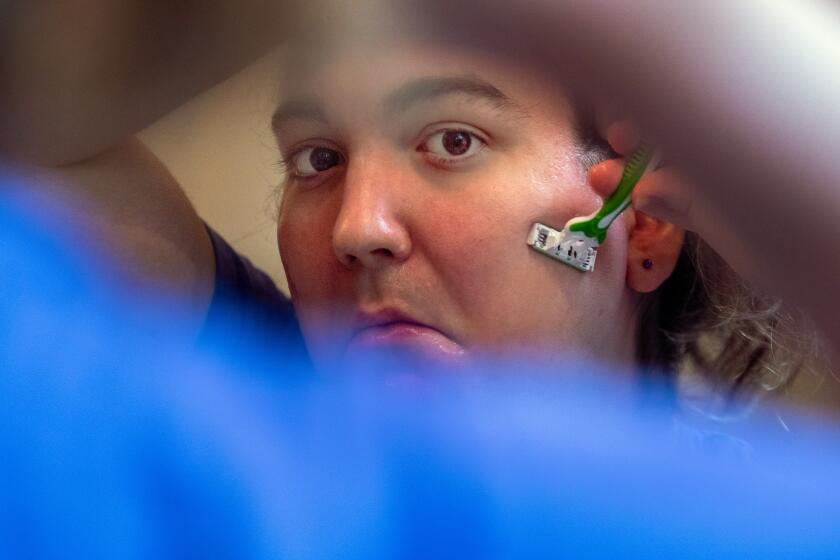Ohio is poised to become the 2nd state to restrict gender-affirming care for adults

- Share via
Ohio Gov. Mike DeWine announced proposals this month that transgender advocates say could block access to gender-affirming care provided by independent clinics and general practitioners, leaving thousands of adults scrambling for treatment and facing health risks.
Ashton Colby, 31, fears the clinic where he gets the testosterone he has taken since age 19 would no longer offer it. The transgender Columbus man believes he could eventually be treated by another provider that would meet the new requirements. But even a few months’ wait could leave Colby experiencing a menstrual cycle for the first time in many years.
“My mental health has been stressed,” Colby said. “These are feelings related to being transgender that I have not felt in years, but now I’m thrown into feeling devastated about my experience as a transgender person.”
DeWine announced the proposed rules amid a whirl of activity that could push Ohio further than most other states in controlling gender-affirming care and make it just the second to set forth restrictions on adult care. He also signed an executive order to ban gender-affirming surgery for minors but vetoed a bill that would ban all gender-affirming care for minors. One chamber of the state Legislature has already overridden it and the other is voting Wednesday on whether to do so.
“It is a policy project that attempts to make it so onerous, so restrictive to get care, that people are functionally unable to do so,” said Kellan Baker, executive director of the Whitman-Walker Institute, a Washington-based organization focused on the health of LGBTQ+ people.
The policies focused on care for adults come in draft administrative rules released this month by the Ohio Department of Health and the state’s Department of Mental Health and Addiction Services.
They would require psychiatrists, endocrinologists and medical ethicists to have roles in creating facility-wide gender-affirming care plans for patients of all ages. Patients under 21 would have to receive at least six months of mental health counseling before starting gender-affirming medication or surgery. Providers would be barred from referring minors to treatment elsewhere, such as clinics in other states.
When he announced the measures, DeWine said they would ensure safe treatment and make it impossible to operate “fly-by-night” clinics.
Florida has outdone other Republican-led states with the most extreme laws in the U.S. targeting transgender adults. Can this lifelong Floridian stay?
The rules are not intended to stop treatment for those already receiving it and are in line with the way specialized care is generally practiced, even if the approach isn’t always state-mandated, said DeWine spokesperson Dan Tierney, who noted the administration is open to wording changes to clarify the rules.
Still, advocates say those rules go beyond the standard of care established by organizations including the World Professional Assn. for Transgender Health, and at any rate there are no sketchy gender clinics in the state.
“It’s bad and unnecessary bureaucracy, and we know what they’re trying to do — and they’re hoping to cut off healthcare for as many people as possible,” said Dara Adkison, board secretary for the advocacy group TransOhio.
Mimi Rivard, a nurse practitioner and clinical director at Central Outreach Wellness Center Ohio’s Columbus clinic, said clinics already successfully prescribe hormones without the involvement of endocrinologists and there aren’t enough of those specialists in the state to do the current work, plus serve an estimated 60,000 Ohioans of transgender experience.
Many transgender patients are wary of other medical settings, which they might see as unfriendly, for more routine needs like hypertension or diabetes, but clinics like hers also treat them for those conditions, she said.
“We have to behave in ways that are consistent with the oaths we’ve taken as caregivers,” Rivard said. “And these guidelines will not allow for this.”
Patients who have undergone surgery and stop hormones could be at risk for osteoporosis and extreme fatigue, she said.
Some of the 3.5 million Muslims in the U.S. are speaking out on topics where they align more closely with Christian conservatives, such as LGBTQ+ rights.
Dr. Carl Streed Jr., president of U.S. Professional Assn. for Transgender Health, who provides gender-affirming care in Boston, noted abortion is the only other realm in which states have weighed in to bar health professionals from providing services allowed by their licenses.
“The rules are draconian. They don’t follow any standard of care,” Streed said. “It is a veil of this false sense of safety that will effectively lead to a ban.”
How the policy would affect transgender patients might depend on where they are treated. The big academic medical centers providing gender-affirming care already employ the required specialists.
Equitas Health, a Columbus-based nonprofit focused on LGBTQ+ healthcare, strongly opposes the regulations but also says it will fulfill the requirements to continue offering gender-affirming care if the rules are finalized.
Transgender rights advocates say new laws can do only so much if they aren’t properly implemented and funded, and designed to help the community’s most vulnerable members.
Advocates warn the care might not be available via smaller clinics or general practitioners, creating more hurdles to care for lower-income, minority and rural transgender people.
Adkison, who lives in Cleveland, expects their own treatment to continue.
“I’m a white person living in the city near multiple major hospital systems,” they said. “I’m definitely not as concerned as many of my friends.”
GOP-controlled governments in 22 other states already have passed bans or restrictions on gender-affirming care for minors. So far, though, adoption of policies aimed at adults is rare.
The only other restriction currently in force at the state level is in Florida, where a law took effect last year requiring physicians to oversee any healthcare related to transitioning, and for those appointments to be in person.
It’s not clear when the Ohio rules might take effect, or in what form if they are finalized. The health department is taking public comment until Feb. 5; for the Department of Mental Health and Addiction Services proposal, public comment is open only until Friday.
The rules also are subject to review of a legislative committee looking at whether rules exceed the administration’s power, something DeWine’s proposals do, said Rhea Debussy, spokesperson for Equitas Health.
“He’s really done an impressive job in the last two weeks, making a lot of Democrats, a lot of progressives, a lot of conservatives and Republicans across the state of Ohio very mad at him,” she said.
The measures were unveiled Jan. 5, the same day DeWine signed an executive order banning gender-affirming surgery for those under 18. Advocates expect the move will have little practical effect because such surgeries are almost never performed on minors.
“It’s very cruel,” said Erin Upchurch, executive director of Kaleidoscope Youth Center, a Columbus-based organization serving young LGBTQ+ people. “It’s vindictive, it’s mean and it’s unnecessary.”
More to Read
Sign up for Essential California
The most important California stories and recommendations in your inbox every morning.
You may occasionally receive promotional content from the Los Angeles Times.
















